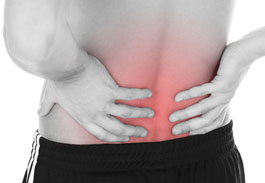Endorphins – When Your Body’s Natural Painkillers Worsen Your Back
By Sherwin Nicholson | Updated May 6, 2020

Endorphins are your body’s natural painkillers
Do you find that sometimes your pain decreases later in the day, and then hurts again the next day?
There is a strong connection to this problem and you may have to blame it on your endorphins!
But first what are they?
They are produced in your central nervous system and by the pituitary gland. It’s these powerful neurotransmitters that act in you to block the transmission of pain signals to various areas that you may be feeling any discomfort.
The word endorphin means, endogenously (within the body) produced morphine (or morphine-like chemical).
This very potent chemical interacts with the opiate receptors in the brain. It reduces or blocks the signals by reducing our perceived sensation of pain.
Other clinical drugs such as morphine and codeine function similarly. There are over 20 naturally produced endorphins generated by the body.
Endorphins are sometimes produced in response to both stress and injury
They are as powerful (if not more) than opium, morphine or other restricted drugs. The difference is that the natural painkillers produced in the body are not addictive and do not lead to dependency. We think of the benefits of these natural substances during times of euphoria.
Examples include: when we are highly excited or aroused events, high levels of happiness, sexual activity and intense exercise.
As valuable as endorphins are in providing sensations of euphoria and relief, they don’t last for long because the effects of the transmitters are short. As they wear off they are released and metabolized from the body quickly.
When you are experiencing pain, whether acute or chronic, your body is producing endorphins to help mask it
When you are hurting during the day, these natural substances are constantly being produced in response to your injury. The endorphins reach a level high enough for us to perceive that our soreness has been lowered.
Towards the end of the day, as your back has triggered to release these endorphins, you begin to believe that your problem has improved. Unfortunately, it hasn’t at all.

Although you may feel that your symptoms have decreased and you feel better, the cause is still very much present. Nothing has improved. Only your perception that it has. This is the common frustration when you wake up in the morning and it hurts.
It’s a very common cycle for people to experience. Symptoms are worse in the morning upon waking, gradually improve throughout the day and towards at bedtime.
As the endorphins no longer bind and wear off, the discomfort returns to the same level if not worse
When you have perceived relief, you may be likely to engage in highly risky activities that may hurt you even more.
Waking up with a very sore and tight back is a perfect example where you feel the return of intense, frustrating pain in the morning when it was believed to have stopped the night before.
Although it’s bad news to find out that you’re still hurting, you now can look for a better way to change your approach to fixing the cause and not only the symptoms.
If you are a senior, I recommend that you check out the AARP site for more drug free remedies.
I developed this site for all of us who are determined and passionate about getting real long term solutions for back problems. You will find many suggestions here to help you have relief.
Sincerely, Sherwin Nicholson.
For more help:
8 MISUNDERSTANDINGS WITH MORNING BACK PAIN
DRUG-FREE REMEDIES FOR YOUR PAIN
ORDER EBOOK (to get you off of OTC meds)
References:
- Acetaminophen in the Management of Acute and Subacute LBP and Neck – Megan Sands-Lincoln, PhD, MPHCorrespondence information about the author PhD, MPH Megan Sands-Lincol Elsevier, Philadelphia, Pa DOI: http://dx.doi.org/10.1016/j.amjmed.2016.04.002 http://www.amjmed.com/article/S0002-9343%2816%2930440-5/fulltext
- Opioids Versus Physical Therapy for Management of Chronic BP – Cassandra A. Gladkowski, RN, BSN; Chelsey L. Medley, RN, BSN; Heather M. Nelson, RN, BSN; Angela Tallie Price, RN, BSN; Margaret Harvey, PhD, APRN-BC Journal for Nurse Practitioners. 2014;10(8):552-559. http://www.medscape.com/viewarticle/832022
- Management of chronic LBP – Nikolai Bogduk Med J Aust 2004; 180 (2): 79-83. https://www.mja.com.au/journal/2004/180/2/management-chronic-lbp
